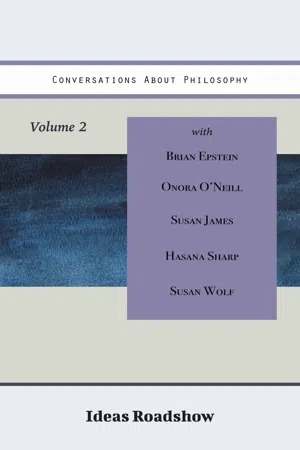
- English
- ePUB (mobile friendly)
- Available on iOS & Android
Conversations About Philosophy, Volume 2
About this book
FIVE BOOKS IN ONE! This collection includes the following 5 complete Ideas Roadshow books featuring leading researchers providing fully accessible insights into cutting-edge academic research while revealing the inspirations and personal journeys behind the research. A detailed preface highlights the connections between the different books and all five books are broken into chapters with a detailed introduction and questions for discussion at the end of each chapter: 1. The Social World, Reexamined - A Conversation with Brian Epstein, Associate Professor of Philosophy at Tufts University. Brian Epstein's career as a management consultant piqued his interest and his later research into the reasons why our current models of economics, politics and other areas of social science so often go terribly wrong. The conversation explores how we can dramatically improve our current economic and political models by reexamining our assumptions about the nature of the social world.2. Kant, Applied -A conversation with Onora O'Neill, Emeritus Professor of Philosophy at the University of Cambridge and a crossbench member of the House of Lords. After intriguing insights into Onora O'Neill's path to becoming a Kant scholar, this wide-ranging conversation explores how Kant's philosophy is relevant for many thorny issues in our contemporary social world, from human rights to patient consent to corporate transparency and more.3. Exploring Spinoza - A Conversation with Susan James, Professor of Philosophy at Birkbeck, University of London. Susan James is an internationally-renowned Spinoza scholar and author of Spinoza on Philosophy, Religion and Politics and Spinoza on Learning to Live Together which are discussed in detail during this wide-ranging conversation. Susan James provides detailed insights into Spinoza's ideas and their current relevance; the political environment and the theological struggle about who has control of religion and how much freedom of religion there was during Spinoza's time, and more. 4. Flourishing Through Spinoza - A Conversation with Hasana Sharp, Associate Professor of Philosophy at McGill University. This conversation provides detailed insights into Hasana Sharp's book Spinoza and the Politics of Renaturalization, in which she offers a sophisticated new interpretation of Spinoza's iconoclastic philosophy. Further topics include the implications of Spinoza's naturalism to today's world, from issues of social inequality, feminism, treatment of the elderly and the environment to animal rights, and more.5. Meaningfulness - A Conversation with Susan Wolf, the Edna J. Koury Professor of Philosophy at the University of North Carolina at Chapel Hill. This fascinating conversation explores what it is to live an ethical, meaningful life in keeping with her book, Meaning in Life and Why It Matters, the role that love, fulfillment, self-interest and happiness play in giving meaning to one's life, and how meaningful activities occur when "subjective attraction meets objective attractiveness". Howard Burton is the founder and host of all Ideas Roadshow Conversations and was the Founding Executive Director of Perimeter Institute for Theoretical Physics. He holds a PhD in theoretical physics and an MA in philosophy.
Tools to learn more effectively

Saving Books

Keyword Search

Annotating Text

Listen to it instead
Information
Introduction
Takin’ It To The Streets
Table of contents
- Textual Note
- Preface
- The Social World, Reexamined
- Kant, Applied
- Exploring Spinoza
- Flourishing Through Spinoza
- Meaningfulness
Frequently asked questions
- Essential is ideal for learners and professionals who enjoy exploring a wide range of subjects. Access the Essential Library with 800,000+ trusted titles and best-sellers across business, personal growth, and the humanities. Includes unlimited reading time and Standard Read Aloud voice.
- Complete: Perfect for advanced learners and researchers needing full, unrestricted access. Unlock 1.4M+ books across hundreds of subjects, including academic and specialized titles. The Complete Plan also includes advanced features like Premium Read Aloud and Research Assistant.
Please note we cannot support devices running on iOS 13 and Android 7 or earlier. Learn more about using the app